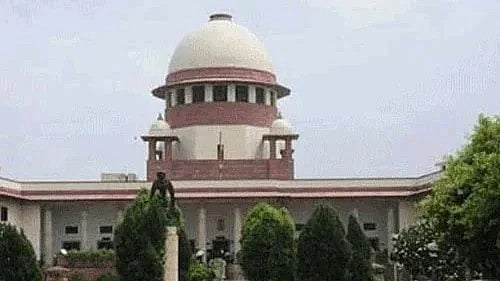
The Supreme Court of India.
Credit: PTI Photo
New Delhi: Defending the Chief Justice of India's authority to act on any judicial misconduct, the Supreme Court on Thursday said he couldn't be "merely a post office" but had the moral responsibility to ensure the judiciary functioned in a transparent, efficient and constitutionally appropriate manner.
"We have no hesitation to say that the CJI is not a mere post office between the committee and the President/the Prime Minister that the report is to be forwarded without any remarks/recommendation. The CJI is clearly an important person, if not the most, in the larger scheme of maintaining institutional interest and credibility to ascertain whether a Judge has indulged in misconduct," the top court said.
The observations came while deciding the plea of Allahabad High Court judge Yashwant Varma, against whom an SC-appointed expert panel filed a damning report over the discovery of burnt wads of cash from his official residence during his judgeship in Delhi.
"As per the procedure, after receiving a complaint against a judge or a report from the Chief Justice of the High Court of which he is a Judge, the CJI has to apply his mind to the nature of complaint/report together with supporting materials, if any," a bench of Justices Dipankar Datta and A G Masih said.
Observing procedure was scrupulously followed, the top court dismissed Varma's plea seeking invalidation of the in-house inquiry report finding him guilty of misconduct in the cash discovery row.
In its judgement, the apex court observed if the CJI believes the matter requires a deeper probe, he is required to constitute a committee for an in-house inquiry.
"The report of inquiry may, or may not, find the allegations against the Judge to be serious, so as to call for any measure. However, if it does, the CJI is under an obligation to forward the report to the President and the Prime Minister. We see no justification to hold that in so forwarding, the CJI may not give his own views," the bench said.
It went on, "The CJI bears a significant moral responsibility as the foremost judicial officer to ensure that the judiciary of the country functions in a transparent, efficient and constitutionally appropriate manner.
Advising judges to be cautious and exercise discretion in judicial conduct, the top court said judicial officers in every rank, and more specifically, judges in the higher echelons of the judiciary "owe huge obligation" to the people of the country.
"No judge, either of the Supreme Court or the High Courts, being above the law, acting in the discharge of his judicial or administrative/non-judicial or official duties in a manner attracting a possible complaint of not abiding by the restatement of values of judicial life (widely regarded now as the Code of Conduct for Judges of the Supreme Court and the High Courts) has to be shunned." While frivolous complaints of disgruntled litigants, lawyers among others couldn't be avoided, the top court said, the path of probity also could never be abandoned by a judge.
"Any thought of there being absence of disciplinary measure other than removal by impeachment (which has never fructified over the years despite occasions calling for it) and therefore escaping unscathed despite committing a misbehaviour or indulging in bad conduct/misconduct, is what is normal, should be eschewed," it added.
The apex court said with the advancement in science and technology and all other spheres of work, it was quite possible to bring to the CJI’s notice how a particular judge might have conducted themselves inappropriately, attracting strict action.
"Withdrawal of judicial work from a judge is an extreme measure that the procedure expressly permits. There are other measures too, which could be explored if judges are found to deviate from the Code of Conduct. The judges should, therefore, act cautiously and exercise their discretion wisely, to evade creation of a situation where initiating action becomes imperative," the verdict opined.
The bench further pointed out that the judiciary in India was characterised by judicial independence, but such independence signified flexibility of judicial thought and the freedom to adjudicate without external and internal pressure and not unfettered liberty to act as one might wish.
"Just as judicial independence is fundamental, so too is judicial accountability, compromising one compromises the other," the verdict added.